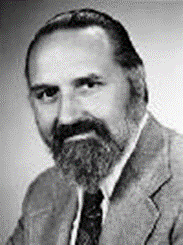The Harrison Shull Lectureship in Chemistry
 The Harrison Shull Lectureship in Chemistry
The Harrison Shull Lectureship in Chemistry
The Harrison Shull Lectureship in Chemistry was established in 2003 by combining memorial donations from friends, colleagues, students, and family of Professor Shull and the previous Computational Lectureship in Chemistry. Under the auspices of this lectureship an outstanding computational chemist is invited to lecture at Indiana University.
HARRISON SHULL (1923-2003)
Harrison Shull was a distinguished scholar, educator, and administrator. He was born August 17, 1923; the youngest son of George Harrison Shull, inventor of hybrid corn and professor of genetics at Princeton University, and Mary Julia Nicholl Shull.
Harrison Shull graduated from Princeton with highest honors in 1943. From then until 1945, he served in the U.S. Navy at the Naval Research Laboratory. He earned his Ph.D. in physical chemistry at the University of California at Berkeley in 1948. On a Rockefeller scholarship, Harrison worked with Robert Mulliken at the University of Chicago, where he began developing molecular orbital theory.
Dr. Shull joined the chemistry department at Iowa State University as an assistant professor and was awarded a Guggenheim Fellowship to pursue research in Quantum Chemistry at Uppsala University in Sweden. While in Sweden, he helped establish the Quantum Chemistry Summer School at Valadolen, Sweden and Sanibel, FL.
From 1955-1979, he was a professor and chair of the chemistry department at Indiana University in Bloomington. An author of over 140 scientific papers and college-level chemistry textbooks, he became an innovator in computer development and use, originating the model Quantum Chemistry Program Exchange (QCPE) and heading the University’s Research Computing Center. He also served as Dean of the Graduate School and Vice Chancellor of the University.
Dr. Shull’s influence on the department and on Indiana University was deep, widespread, and lasting. Together with Lynne Merrit, professor of chemistry, and Marshall Wrubel, professor of astronomy, he arranged for the first University purchase of a digital computer, the IBM 650. Then, in 1959, the university’s Research Computing Center was established, with Dr. Shull as its first director. Many graduate students and postdocs who gained their training with Dr. Shull’s research group went on to prominent careers in academic and government laboratories, including Stan Hagstrom and Ernest Davidson, who served as faculty members in our department.
From 1979 to 1982, Dr. Shull served as Vice President and Provost of Rensselaer Polytechnic Institute. In 1982, he was appointed Chancellor of the University of Colorado at Boulder. In 1985 he became Provost and Vice President for Academic Affairs at the Naval Postgraduate School in Monterey CA. Dr. Shull retired in 1995.
Dr. Shull was elected to the National Academy of Science, one of science’s highest recognitions, in 1969. He was also a fellow of the American Academy of Arts and Sciences, and a member of the American Physical Society, the American Association for the Advancement of Science, the American Chemical Society, and several other scientific and research associations and Phi Beta Kappa. He was an active international member of the Kungliga Vetenskaps Akademin and the Faraday Society.
Throughout his career and retirement, he was active on several national boards and commissions, including the Federal Manpower Commission, the Institute for Defense Analysis, and the Naval Studies Board. He led a science policy initiative with the then Soviet Union and worked for the release of Professor Andrei Sakharoff. Dr. Shull was awarded a Congressional Medal and a Special Tribute from the Institute for Defense Analysis.
His ready handshake, good nature, and hearty laugh warmed the hearts of all who knew him. He was an excellent, creative, and patient teacher. In addition to science and mathematics, his interests and knowledge spanned wide areas including history, literature, languages, commerce, finance, and government. He was a creative, unbiased, and provocative thinker: a true scholar and gentleman. First and foremost, however, he was a beloved and devoted husband, father, and grandfather. Dr. Shull is survived by his wife, Willa, seven children, and 10 grandchildren.
Harrison Shull Lecturers
2025 Sharon Hammes-Schiffer
2025 Michele Parrinello
2022 George C. Schatz
2019 Martin Head-Gordon
2004 Kenneth A. Dill


